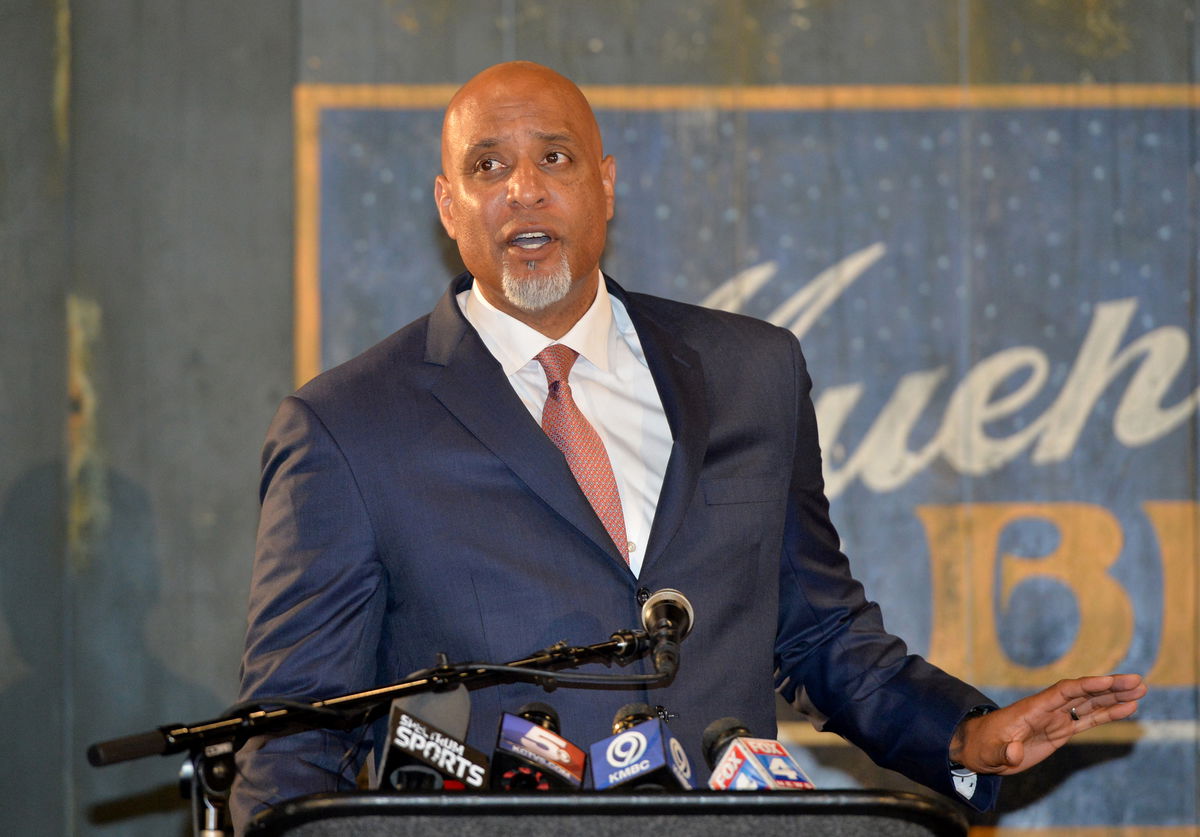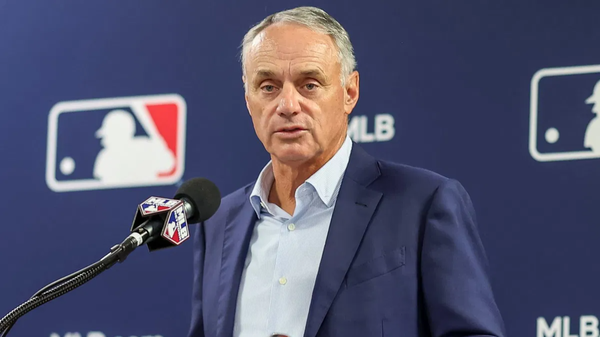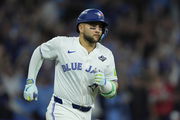

Tensions are rising off the diamond and it is not because of a blown call or a playoff race. Behind closed doors, the future of MLB is quietly inching toward a breaking point—with words like “lockout” and “salary cap” now creeping back into the interaction. The mood isn’t just cautious—it is combative. And at the heart of it all is Tony Clark, preparing for a showdown that could reshape the league’s entire financial structure.
Watch What’s Trending Now!
As baseball targets the upcoming collective bargaining deal in 2026, the focus has already taken a heated turn. Clark, especially, as executive director of the MLB Players Association does not seem to be buying what ownership is selling. Now, this growing tension stems from a looming salary cap debate. Despite luxury taxes being in place, bullpens like the Dodgers and Mets have smashed spending records. Commissioner Rob Manfred claims that “competitive balance” and crumbling regional TV deals have forced the increasing payroll issues, but Tony Clark refuses to see it that way. Instead, Clark argues that a cap would strip athletes of guaranteed earnings and pit teammates against each other in an artificial system built to protect profits, not parity.
But the players are not alone in this— even active talents such as Pete Alonso are sounding alarms. At the All-Star Game, Alonso said bluntly, “We all know they’re going to lock us out for it, and then we’re going to miss time.” He is not wrong, baseball’s recent history includes a 99-day lockout just three years ago. That one ended in time to preserve the season. This time, things feel far more flammable.
ADVERTISEMENT
Still, owners appear determined to revamp the system. Manfred admits he avoids saying “salary cap” outright, but he insists there are “real problems” that need a more proactive addressing. The proposed system might include a salary floor and revenue guarantees, but for players, that is still lipstick on a very familiar pig. Agent Scott Boras likened it to a “gingerbread house,” saying the idea looks sweet but finally navigates nowhere good for players.
Union chief Tony Clark on a salary cap: ‘This is not about competitive balance. This is institutionalized collusion.”
— Bob Nightengale (@BNightengale) July 15, 2025
The underlying message from the union is simple: this is not about fixing the game, it is regarding the control. And with historic contracts like Juan Soto’s $765 million deal and Shohei Ohtani’s $700 million, setting new records, players are in no rush to rebuild the rulebook. As the league pushes toward 2026, both sides are clearly striving for impact. Clark is also Union Head, so if he has made his stance on the salary cap crystal clear, the brewing resistance is not just coming from talent; some of the league’s biggest spenders are equally skeptical about it. And they’re not staying silent, either.
ADVERTISEMENT
Big-Market teams set to push back on salary cap proposals like Tony Clark
As Rob Manfred lays the groundwork for a potential salary cap by 2027, a group of deep-pocketed franchises is already gearing up to challenge the notion. At the front of the opposition are the Dodgers and Mets, two franchises with payrolls that dwarf most of the league. For the Dodgers, the stakes are humongous: they are staring down over $1 billion in deferred payments stretching through 2046, all structured under the current system. A cap would not just limit future spending, it could jeopardize the financial logic behind years of planning.
ADVERTISEMENT
Meanwhile, Mets owner Steve Cohen has been contentious about his big-budget approach since buying the team for $2.4 billion in 2020. A salary cap would directly restrict his freedom to invest in the team as he pleases, punishing ambition rather than rewarding it. With Cohen already on the hook for a nearly $100 million luxury tax last year and more expected this season, any forced redistribution of his team’s resources to other clubs is not likely to sit well.

Imago
Image: MLB.com
That pushback does not end with the Mets or Dodgers. The Philadelphia Phillies, who have maintained a $240+ million payroll for four straight seasons, also have reason to resist. Bolstered by a long-period $2.5 billion media deal, the team has showcased its willingness to compete financially with anyone. A cap could abruptly stop their spending momentum and redirect funds to division rivals like the Marlins or Nationals clubs they have outspent for years.
ADVERTISEMENT
And then there are the New York Yankees. As one of the most profitable teams in sports, their $728 million revenue stream in 2024 is already adding to league-wide balance through revenue sharing. From their vantage point, further restrictions are unjust. Yankees owner Hal Steinbrenner has been vocal, criticizing small-market bullpens for choosing not to spend, even when supported by shared revenue. In his eyes, it is not a matter of fairness but efficiency. Forcing the league’s biggest earners to bankroll competitors while cutting back their own payrolls just does not add up.
Top Stories
Rift Cracks Open in Blue Jays as Real Reason Behind Bo Bichette’s Exit Emerges, per Insider

Fact Check: Is MLB’s Bias Towards Dodgers Helping Them Save over $60M a Year?

Who Are Kyle Tucker’s Parents? All about Mike Tucker and Lisa Fernandez

David Stearns Breaks Silence on Kodai Senga’s Mets Future as Freddy Peralta Call Triggers Major Upheaval

Mets Immediately Retaliate After Cody Bellinger failure by Stealing Yankees’ Prime Trade Target

With these influential teams pushing back, any proposed salary cap may face more resistance inside ownership circles than Manfred might have expected. The battle lines are already drawn not just between labor and management, but between baseball’s haves and have-nots.
`
ADVERTISEMENT
ADVERTISEMENT
ADVERTISEMENT
ADVERTISEMENT